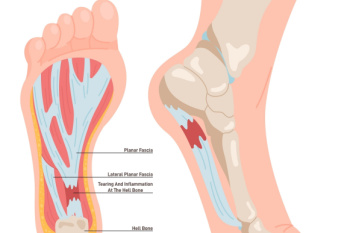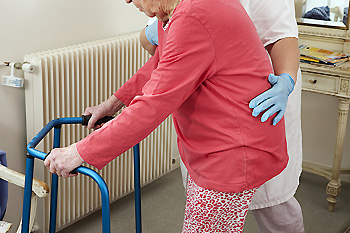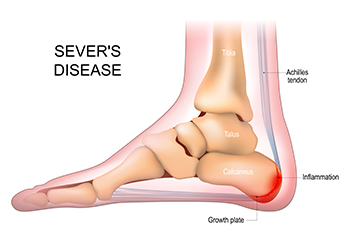Connect With Us
Blog
Items filtered by date: June 2024
Facts About Plantar Fasciitis and Its Symptoms

Plantar fasciitis is a common cause of heel pain, resulting from inflammation of the plantar fascia, which is the thick band of tissue that runs along the bottom of the foot and connects the heel bone to the toes. The condition typically causes a sharp, stabbing pain in the heel, particularly noticeable with the first steps in the morning or after periods of inactivity. Risk factors include prolonged standing, high-impact activities, obesity, and wearing unsupportive shoes. The pain usually lessens with movement but can return after long periods of standing or sitting. Treatment often involves stretching exercises, wearing proper footwear, and rest to reduce inflammation. In severe cases, orthotics or injections may be necessary. Plantar fasciitis can cause severe pain and can hinder completing daily activities. If you have heel pain, it is strongly suggested that you are under the care of a podiatrist who can accurately diagnose and treat plantar fasciitis.
Plantar fasciitis is a common foot condition that is often caused by a strain injury. If you are experiencing heel pain or symptoms of plantar fasciitis, contact Dr. Nicholas Przystawski from Central Florida Foot Care, PA. Our doctor can provide the care you need to keep you pain-free and on your feet.
What Is Plantar Fasciitis?
Plantar fasciitis is one of the most common causes of heel pain. The plantar fascia is a ligament that connects your heel to the front of your foot. When this ligament becomes inflamed, plantar fasciitis is the result. If you have plantar fasciitis you will have a stabbing pain that usually occurs with your first steps in the morning. As the day progresses and you walk around more, this pain will start to disappear, but it will return after long periods of standing or sitting.
What Causes Plantar Fasciitis?
- Excessive running
- Having high arches in your feet
- Other foot issues such as flat feet
- Pregnancy (due to the sudden weight gain)
- Being on your feet very often
There are some risk factors that may make you more likely to develop plantar fasciitis compared to others. The condition most commonly affects adults between the ages of 40 and 60. It also tends to affect people who are obese because the extra pounds result in extra stress being placed on the plantar fascia.
Prevention
- Take good care of your feet – Wear shoes that have good arch support and heel cushioning.
- Maintain a healthy weight
- If you are a runner, alternate running with other sports that won’t cause heel pain
There are a variety of treatment options available for plantar fasciitis along with the pain that accompanies it. Additionally, physical therapy is a very important component in the treatment process. It is important that you meet with your podiatrist to determine which treatment option is best for you.
If you have any questions, please feel free to contact our office located in Leesburg, FL . We offer the newest diagnostic and treatment technologies for all your foot care needs.
Foot Pain and Falls Prevention for Elderly
 Foot pain is a significant concern among the elderly population that contributes to an increased risk of falls and related injuries. As people age, they may experience various foot problems such as arthritis, neuropathy, and decreased sensation, any of which can affect balance and stability. Foot pain can make it challenging for older adults to walk safely and confidently, increasing the likelihood of slips, trips, and falls. These falls can result in serious injuries like fractures, head injuries, and a loss of functioning independently. Therefore, it is important for seniors experiencing foot pain to seek professional care from a podiatrist to address underlying issues and implement preventive measures. Changes in regimens like wearing proper footwear, doing foot exercises, and getting regular foot examinations can help reduce foot pain and minimize the risk of falls, enabling older adults to maintain their mobility and quality of life. If you are elderly or someone you know who is elderly experiences foot pain or frequent falls, it is suggested that you make an appointment with a podiatrist for an evaluation.
Foot pain is a significant concern among the elderly population that contributes to an increased risk of falls and related injuries. As people age, they may experience various foot problems such as arthritis, neuropathy, and decreased sensation, any of which can affect balance and stability. Foot pain can make it challenging for older adults to walk safely and confidently, increasing the likelihood of slips, trips, and falls. These falls can result in serious injuries like fractures, head injuries, and a loss of functioning independently. Therefore, it is important for seniors experiencing foot pain to seek professional care from a podiatrist to address underlying issues and implement preventive measures. Changes in regimens like wearing proper footwear, doing foot exercises, and getting regular foot examinations can help reduce foot pain and minimize the risk of falls, enabling older adults to maintain their mobility and quality of life. If you are elderly or someone you know who is elderly experiences foot pain or frequent falls, it is suggested that you make an appointment with a podiatrist for an evaluation.
Preventing falls among the elderly is very important. If you are older and have fallen or fear that you are prone to falling, consult with Dr. Nicholas Przystawski from Central Florida Foot Care, PA. Our doctor will assess your condition and provide you with quality advice and care.
Every 11 seconds, an elderly American is being treated in an emergency room for a fall related injury. Falls are the leading cause of head and hip injuries for those 65 and older. Due to decreases in strength, balance, senses, and lack of awareness, elderly persons are very susceptible to falling. Thankfully, there are a number of things older persons can do to prevent falls.
How to Prevent Falls
Some effective methods that older persons can do to prevent falls include:
- Enrolling in strength and balance exercise program to increase balance and strength
- Periodically having your sight and hearing checked
- Discuss any medications you have with a doctor to see if it increases the risk of falling
- Clearing the house of falling hazards and installing devices like grab bars and railings
- Utilizing a walker or cane
- Wearing shoes that provide good support and cushioning
- Talking to family members about falling and increasing awareness
Falling can be a traumatic and embarrassing experience for elderly persons; this can make them less willing to leave the house, and less willing to talk to someone about their fears of falling. Doing such things, however, will increase the likelihood of tripping or losing one’s balance. Knowing the causes of falling and how to prevent them is the best way to mitigate the risk of serious injury.
If you have any questions, please feel free to contact our office located in Leesburg, FL . We offer the newest diagnostic and treatment technologies for all your foot care needs.
Wearing High Heels to Work
 Wearing high heels to work every day can have a significant effect on the feet and the rest of the body. High heels shift body weight forward, increasing pressure on the forefoot and leading to conditions like bunions, hammertoes, and metatarsalgia. The unnatural angle of the foot can cause calf muscle tightening and Achilles tendon shortening, resulting in discomfort and pain. Over time, high heels can alter posture, leading to lower back, hip, and knee pain due to misalignment of the spine and joints. Wearing high heels may seem glamorous, but it can also cause pain, blisters, and calluses. To mitigate these effects, choose heels with lower heights, opt for wedges or platforms for better weight distribution, and use cushioned insoles. It can also help to regularly stretch the calves and feet, and alternating with more supportive footwear. If you enjoy wearing heels to work and you have persistent foot pain, it is suggested that you schedule an appointment with a podiatrist for advice and care.
Wearing high heels to work every day can have a significant effect on the feet and the rest of the body. High heels shift body weight forward, increasing pressure on the forefoot and leading to conditions like bunions, hammertoes, and metatarsalgia. The unnatural angle of the foot can cause calf muscle tightening and Achilles tendon shortening, resulting in discomfort and pain. Over time, high heels can alter posture, leading to lower back, hip, and knee pain due to misalignment of the spine and joints. Wearing high heels may seem glamorous, but it can also cause pain, blisters, and calluses. To mitigate these effects, choose heels with lower heights, opt for wedges or platforms for better weight distribution, and use cushioned insoles. It can also help to regularly stretch the calves and feet, and alternating with more supportive footwear. If you enjoy wearing heels to work and you have persistent foot pain, it is suggested that you schedule an appointment with a podiatrist for advice and care.
High heels have a history of causing foot and ankle problems. If you have any concerns about your feet or ankles, contact Dr. Nicholas Przystawski from Central Florida Foot Care, PA. Our doctor can provide the care you need to keep you pain-free and on your feet.
Effects of High Heels on the Feet
High heels are popular shoes among women because of their many styles and societal appeal. Despite this, high heels can still cause many health problems if worn too frequently.
Which Parts of My Body Will Be Affected by High Heels?
- Ankle Joints
- Achilles Tendon – May shorten and stiffen with prolonged wear
- Balls of the Feet
- Knees – Heels cause the knees to bend constantly, creating stress on them
- Back – They decrease the spine’s ability to absorb shock, which may lead to back pain. The vertebrae of the lower back may compress.
What Kinds of Foot Problems Can Develop from Wearing High Heels?
- Corns
- Calluses
- Hammertoe
- Bunions
- Morton’s Neuroma
- Plantar Fasciitis
How Can I Still Wear High Heels and Maintain Foot Health?
If you want to wear high heeled shoes, make sure that you are not wearing them every day, as this will help prevent long term physical problems. Try wearing thicker heels as opposed to stilettos to distribute weight more evenly across the feet. Always make sure you are wearing the proper shoes for the right occasion, such as sneakers for exercising. If you walk to work, try carrying your heels with you and changing into them once you arrive at work. Adding inserts to your heels can help cushion your feet and absorb shock. Full foot inserts or metatarsal pads are available.
If you have any questions please feel free to contact our office located in Leesburg, FL . We offer the newest diagnostic and treatment technologies for all your foot and ankle needs.
Do Your Child's Feet Hurt?
Sever's Disease and How to Find Relief

Sever's disease, also known as calcaneal apophysitis, is a common cause of heel pain in children and adolescents, particularly those who are active in sports. This condition occurs when the growth plate at the back of the heel becomes inflamed due to repetitive stress or tension. As children's bones grow faster than their muscles and tendons, excessive pulling on the heel's growth plate can lead to discomfort, swelling, and tenderness. Identifying Sever's disease typically involves a thorough examination by a podiatrist, including a review of symptoms and a physical assessment. While the condition often resolves on its own once growth plate closure occurs, there are several strategies for managing symptoms and finding relief. These may include rest, stretching exercises, and supportive footwear with cushioning insoles. If your active child has heel pain, it is suggested that you visit a podiatrist who can diagnose if it is Sever's disease, and offer the appropriate treatment method.
Sever's disease often occurs in children and teens. If your child is experiencing foot or ankle pain, see Dr. Nicholas Przystawski from Central Florida Foot Care, PA. Our doctor can treat your child’s foot and ankle needs.
Sever’s Disease
Sever’s disease is also known as calcaneal apophysitis, which is a medical condition that causes heel pain I none or both feet. The disease is known to affect children between the ages of 8 and 14.
Sever’s disease occurs when part of the child’s heel known as the growth plate (calcaneal epiphysis) is attached to the Achilles tendon. This area can suffer injury when the muscles and tendons of the growing foot do not keep pace with bone growth. Therefore, the constant pain which one experiences at the back of the heel will make the child unable to put any weight on the heel. The child is then forced to walk on their toes.
Symptoms
Acute pain – Pain associated with Sever’s disease is usually felt in the heel when the child engages in physical activity such as walking, jumping and or running.
Highly active – Children who are very active are among the most susceptible in experiencing Sever’s disease, because of the stress and tension placed on their feet.
If you have any questions, please feel free to contact our office located in Leesburg, FL . We offer the newest diagnostic and treatment technologies for all your foot and ankle injuries.

